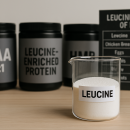A plant-based diet offers numerous health benefits, including reduced risk of chronic diseases, lower environmental impact, and ethical considerations.
However, individuals following a vegan or vegetarian lifestyle may be at risk of nutrient deficiencies due to the absence or limited intake of certain nutrients found predominantly in animal products.
To ensure optimal health and well-being, it is essential for vegans and those with low meat intakes to pay attention to their nutrient intake and consider supplementing with key vitamins and minerals.
Here are some recommended supplements to support a balanced and thriving plant-based diet:
1. VITAMIN B12
Vitamin B12, also known as cobalamin, is primarily found in animal products such as meat, fish, eggs, and dairy.
Vitamin B12 plays a crucial role in nerve function, DNA synthesis, and red blood cell formation.
Since plant foods are not reliable sources of vitamin B12, vegans and individuals with low meat intakes are at risk of deficiency.
Supplementing with vitamin B12 is essential to prevent deficiency-related complications, including anemia and neurological disorders.

2. VITAMIN D
Vitamin D is important for bone health, immune function, and mood regulation.
While sunlight exposure triggers vitamin D synthesis in the skin, individuals living in northern latitudes or those who have limited sun exposure may require supplementation, especially during winter months.
Plant-based sources of vitamin D are limited, making supplementation with vitamin D3 (cholecalciferol) a valuable option.
However, when selecting a vegan-friendly Vitamin D source, please ensure that they are derived from lichen or other vegan sources, as Vitamin D in supplements is commonly isolated from lanolin found in wool, which is not vegan friendly.
3. OMEGA-3 FATTY ACIDS
Omega-3 fatty acids, particularly eicosapentaenoic acid (EPA) and docosahexaenoic acid (DHA), are essential for brain health, cardiovascular function, and inflammation regulation.
The human body can mae EPA and DHA from the alpha-linolenic acid (ALA) that can be obtained from plant sources like flaxseeds, chia seeds, and walnuts. However, this convesion is inefficient, making supplementation important.
Vegans can turn to algae-based omega-3 supplements, which provide preformed DHA and EPA derived from algae, is recommended for vegans and individuals with low fish intake.
4. IRON
Iron is essential for oxygen transport, energy metabolism, and immune function.
Plant-based sources of iron, such as legumes, whole grains, nuts, seeds, and leafy green vegetables, provide non-heme iron, which is less readily absorbed than heme iron from animal products.
To enhance iron absorption, it is advisable to consume vitamin C-rich foods alongside iron-rich plant foods.
Additionally, individuals at risk of iron deficiency, such as menstruating individuals and pregnant women, may benefit from iron supplementation under the guidance of a healthcare professional.
5. CALCIUM
Calcium is vital for bone health, muscle function, and nerve transmission.
While dairy products are commonly associated with calcium intake, several plant foods, including fortified plant milks, tofu, leafy greens, and almonds, can contribute to calcium intake in a vegan diet.
However, individuals with limited intake of these foods or those with increased calcium needs may consider calcium supplementation.
Good supplemental forms to look out for are Calcium bisglycinate, citrate and carbonate. These are my go-to forms when developing supplements.
6. ZINC
Zinc plays a crucial role in immune function, wound healing, and DNA synthesis.
Plant-based sources of zinc include legumes, whole grains, nuts, seeds, and tofu.
However, the bioavailability of zinc from plant foods may be lower due to the presence of phytates, compounds that bind to zinc and inhibit its absorption.
Therefore, vegans and individuals with low meat intakes may benefit from zinc supplementation, particularly if their dietary intake is inadequate or if they have increased zinc requirements.
CONCLUSION
A well-planned vegan or vegetarian diet can provide ample nutrients for optimal health and well-being.
However, certain nutrients may be lacking or present in insufficient amounts in plant-based diets, necessitating supplementation for some individuals.
By incorporating key supplements such as vitamin B12, vitamin D, omega-3 fatty acids, iron, calcium, and zinc, vegans and those with low meat intakes can ensure they meet their nutritional needs and thrive on a plant-based diet.
It is essential to consult with a healthcare professional or registered dietitian to assess individual nutrient requirements and determine appropriate supplement dosages for optimal health.
With proper planning and supplementation, individuals can enjoy the numerous health benefits of a plant-based lifestyle while maintaining optimal nutrient status.
Picture attributions:
Feature image by xb100 on freepik







Leave a Reply